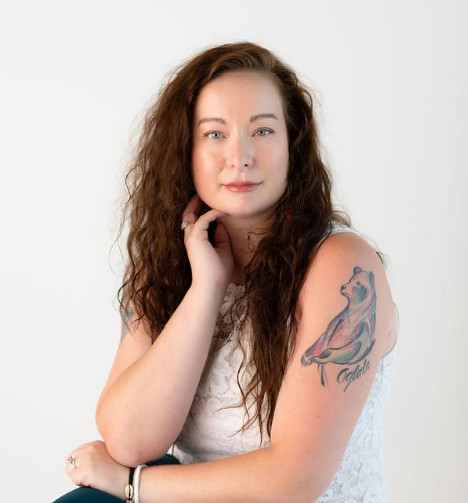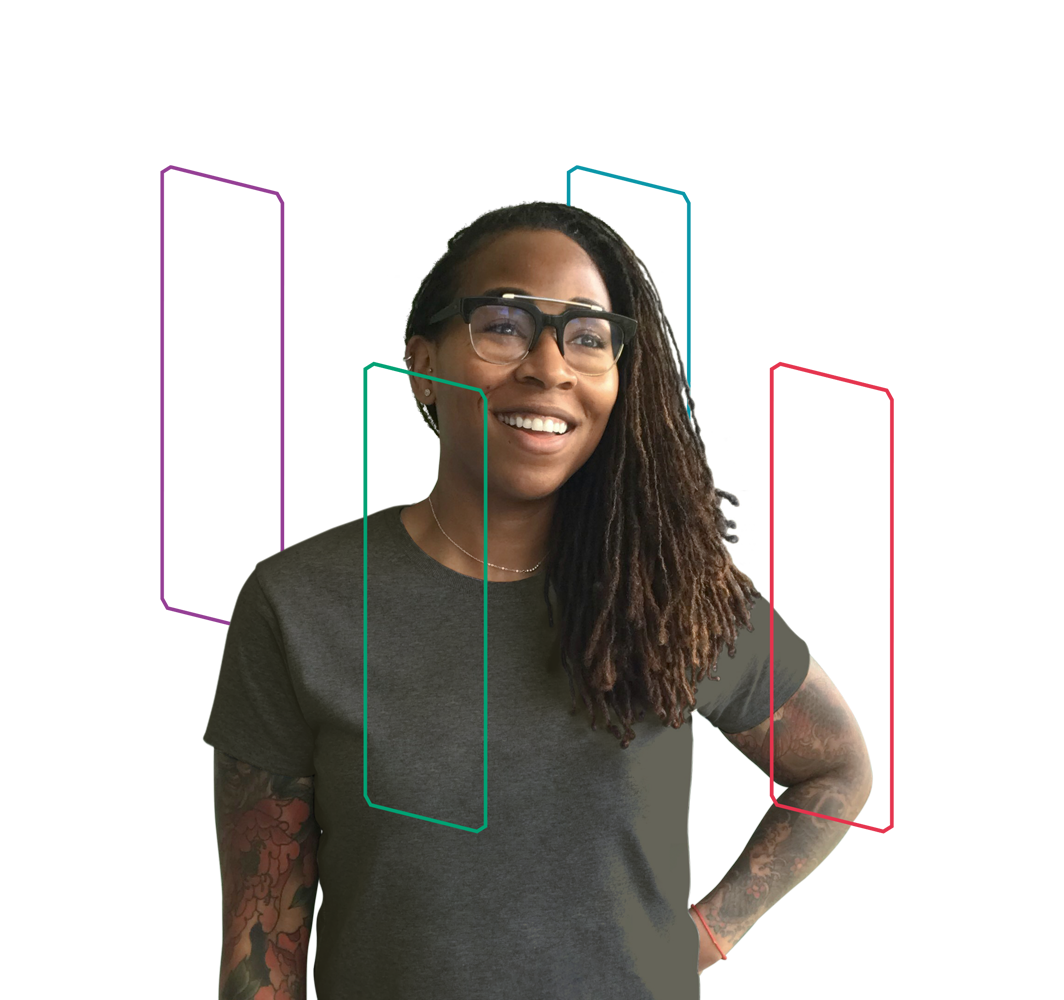Are you a skimmer?
No problem, we’ve got you! Take a spin through the list of interview highlights below, complete with timestamps to skip straight to the episode content that’s most relevant to you.
Introduction
It’s the season finale, SHIFT Talkers! And we couldn’t think of a better guest to close us out than Whitney Fear, a psychiatric NP practicing at a federally qualified health center (FQHC) in North Dakota. Whitney grew up on the Pine Ridge Reservation in South Dakota, where her childhood was shaped by alcoholism, uncertainty, trauma, and poverty.
Like many Lakota women, Whitney is resilient, though, and remains grounded in compassion and generosity—values that are core to both her culture and the nursing profession. She took her early life experiences and used them to develop a trauma-informed and culturally sensitive approach to care. Whitney truly listens to her patients, and she honors whatever is authentic to their experience.
We were honored to hear her story. We were honored to hear all our guests’ stories. Jasmine, Stacy, Nikki, Cyrus, Patrick, and Whitney—thank you for sharing your perspectives on health equity and your life experiences with us this season. Each of you encouraged us to look beyond buzzwords and simply consider the ways we interact with people. Because when nurses take the time to ask questions, listen carefully to the answers, and treat others how they want to be treated, we are taking steps toward a more just and healthy future for everyone. And, as Whitney says, we do feel good.
Interview Highlights
4:12
Whitney on growing up on a Native American reservation: “Daily life is kind of a struggle. My family has a small cattle operation … and like a lot of small operations, there’s a lot of uncertainty.”
Whitney and her brother started helping their parents out as soon as they were old enough, and she said they were happy to do it. Although her parents sometimes struggled to make ends meet, and she had family members who struggled with alcoholism and could be violent, Whitney was surrounded by dozens of honorary “aunties,” “uncles,” “grandpas” and “grandmas” in her community, and she felt a strong sense of kinship throughout her childhood.
6:37
Whitney on the impact of inaccurate census counts on reservation funding: “It’s a little bit of a controversial issue about tribal enrollment, because some people feel it’s colonialism to enroll your child …”
Census counts impact federal funding. So if there are artificially low counts, it decreases funds and thus further exacerbates the poverty and poor health experienced on reservations. Whitney gets into the reasons why enrollments are low. First, there’s a requirement to provide blood quantum to register with a tribe, which Whitney likens to the way you’d provide a pedigree for a horse or dog you register in a show. On top of that, families on the reservation prioritize helping each other out, which often means having more people in their home than their official housing arrangement allows. These factors and more contribute to the low counts Whitney speaks about.
8:43
Whitney describing the beauty of her Lakota heritage: “Traditional Lakota society was matriarchal … a huge emphasis on treating women and children and elders and members of the LGBTQ or ‘two spirit’ community with … respect.”
The Lakota culture prioritizes the values of compassion and generosity, with a genuine reverence for women for the maternal gift they give when they risk their own safety to bring new life into the world. Overall, Lakota people are judged based on what they give away and do for others during their lives, not the amount of wealth they amassed or their personal accomplishments.
11:48
Whitney talks about her struggles as a teenager and desire to leave the reservation: “I had almost not graduated high school … I had a 0.5 GPA going into my third year …”
As an adolescent, Whitney had a lot of anger and sadness inside her. She drank heavily, skipped school and had failing grades. But her guidance counselor and one of her Lakota “aunties” saw her potential and told her that it would be a shame if after all the things her ancestors went through, she wasted that potential by doing nothing with her life. Education, her auntie said, would give her a seat at the table as a decision-maker, whatever she decided to do. So Whitney enrolled in classes at the tribal college, graduated high school, and was accepted into college.
15:36
Whitney on how she got on the path to nursing: “I’d been thinking about a career in the health care field for a while, but I didn’t think I would be considered for admission because of my high school GPA.”
While Whitney talks to Nacole about how she got into nursing, they also touch on the challenges of tribal colleges. Although they offer a solid education, it’s difficult to attract teachers, who have to work just as hard to keep kids from dropping out as they do to educate them. Whitney herself was overwhelmed by her nursing degree prerequisites, but she was working in a psychiatric hospital while in school, and the nurses there gave her the support she needed to stick with it and pursue the LPN path. She worked at night and went to class during the day—it was hard, but her persistence just confirmed the strength of her commitment to becoming a nurse.
17:43
Whitney on the similarities between her Lakota heritage and the nursing profession: “Compassion and generosity are our two huge traditional Lakota values … I feel nurses are generous.”
Whitney mentions to Nacole that she read Florence Nightingale’s Notes on Nursing many times early in her education and nursing career. In it, she saw a clear connection between Lakota values and Nightingale’s vision of nursing. Nightingale calls on nurses to have compassion for patients and remember that they’re not at their best when they’re sick. She also speaks to generosity, and Whitney believes strongly that nurses today still embody that value. The fact that we’re the most trusted profession for over a decade proves it, doesn’t it?
20:31
Whitney on the role that FQHCs play in promoting health equity: “FQHC is really set up to be the safety net healthcare provider … we’re a literal lifeline for a lot of people.”
The FQHC that Whitney works at is also a Level 3 Patient-Centered Medical Home, which means that patients can get all their care there. The services offered range from primary care to dental care to midwifery to smoking cessation to Whitney’s own area of behavioral health¾and beyond. The clinic accepts everyone—whether they have insurance or not. Whitney even brings her own family there, because she feels like the clinic is a true medical home.
25:58
Whitney on the barriers the clinic’s patient population faces: “Probably the first big barrier that I think has a really significant impact is just major mistrust of providers.”
For people experiencing homelessness in particular, which is the population Whitney served for the first six years she worked at the clinic, trust is a big issue. Many have a history of being institutionalized, incarcerated or otherwise treated in a way that was not helpful for their health. Whitney points out that providers aren’t always open-minded when it comes to dealing with mental illness. And although she hates the term “crazy,” Whitney’s not above reminding other providers that being “crazy” isn’t itself a crime. She talks with Nacole about the downside of psychiatric medications. Many have horrible side effects, and Whitney really believes that it’s wrong to push these medications on patients. Instead, she wants to empower her patients to make informed decisions.
28:47
Whitney explains a harm reduction model: “Instead of … an approach like abstinence … what are some things that you would like to see improve that don’t involve quitting drinking altogether?”
With substance abuse, it’s not about getting people who aren’t ready to quit using. Instead, it’s about helping them feel better. If a patient has alcoholic gastritis, for example, then the nurse might advise them to switch to a different kind of alcohol or avoid spicy food, and then they might prescribe a proton pump inhibitor (PPI—medications like Prilosec or Nexium). This is more productive than pushing people to quit, says Whitney, noting that recommended guidelines are just that—guidelines. They’re not meant for every patient.
31:01
Whitney talks about the virtual medical detox she helped set up: “I was thinking of a list of people that if they got put into quarantine, their alcohol withdrawal is so dangerous.”
It was a priority for all providers early in the pandemic, she reminds Nacole, to keep patients out of the ER and keep ICUs free for COVID-19 patients. North Dakota doesn’t have a single medical detox program or facility, though, so Whitney was really worried about the unhoused patients she used to treat in her role at the clinic prior to receiving her NP degree. She started coordinating with the city and local shelters to create a virtual medical detox program. Whitney saw patients through telehealth, assessed their withdrawal and prescribed treatment. Other staff involved would go to the pharmacy to pick up medications. None of the people Whitney treated in the program visited the ER for issues related to detox, a true testament to her efforts and the value of being creative in how you approach your patients.
35:45
Whitney gives advice to nurses who want to promote equity but don’t have lived experience with social determinants of health: “I would really implore nurses to look into trauma-informed care, and not only what that can do for your patients, but what that can do for you.”
Whitney urges nurses to look at the studies that conclusively show a positive correlation between peoples’ negative past experiences and the development of chronic health issues. She adds that nurses who adopt a trauma-informed care approach actually have lower rates of burnout, because the approach takes the accountability for patients’ actions off the nurse and puts responsibility back on the patients.
37:46
Whitney shares a time when she was too quick to judge a patient: “This patient had had a massive heart attack … [their] spouse brought them in McDonald’s and I thought … you gotta be kidding me.”
One of the things that we love about Whitney is that she recognizes that building empathy and understanding of the impact of social determinants of health is a journey. Looking back on her patient who had fast food, Whitney remembers that they chose a fish sandwich instead of a hamburger, and they didn’t get fries. In hindsight, she realized that they were trying to follow her instructions¾it was just that their ability to do so was limited by the circumstances of their life. We’ve all been there, right, SHIFT Talkers? We’ve all made snap judgments and realized later that we didn’t appreciate the full context of a person’s situation. The bottom line is that Whitney isn’t asking us to be perfect—she’s simply asking us to try harder to understand what motivates the people we care for. And to realize that they ultimately own their health. It’s our job, as nurses, to give them the best guidance we can¾and then let them live their lives.
Thank you so much, SHIFT Talkers, for tuning in this season. We hope that the conversations you’ve listened to have shown you not only how important it is to promote health equity for all your patients, but also the numerous ways in which—at any point in your career—you can become an advocate and an actor for health equity.



